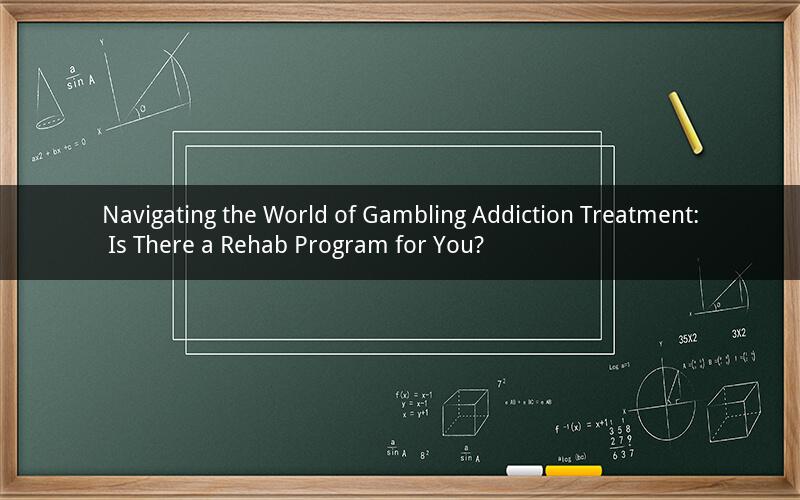
In today's fast-paced society, the allure of gambling has become increasingly prevalent. Whether it's the thrill of placing a bet on a sports game or the excitement of spinning the reels on a slot machine, gambling can quickly become an addictive behavior. If you or someone you know is struggling with gambling addiction, the question often arises: Is there rehab for gambling addiction? This article delves into the world of gambling addiction treatment, exploring the available options and providing valuable insights to help you make an informed decision.
1. Understanding Gambling Addiction
Gambling addiction, also known as compulsive gambling, is a psychological disorder characterized by an irresistible urge to gamble despite negative consequences. Individuals with gambling addiction often experience intense cravings, anxiety, and distress when they are unable to gamble. It's crucial to recognize the signs and symptoms of gambling addiction to seek appropriate treatment.
2. The Importance of Treatment
Treatment for gambling addiction is essential to break the cycle of compulsive behavior and restore a sense of control over one's life. Without proper intervention, the addiction can worsen, leading to severe financial, emotional, and social consequences. Rehabilitation programs offer a structured and supportive environment to help individuals overcome their addiction and develop healthier habits.
3. Types of Treatment Programs
a. Inpatient Rehabilitation Programs
Inpatient rehab programs provide round-the-clock care and support for individuals struggling with gambling addiction. These programs often last from 30 to 90 days and include a variety of therapeutic approaches, such as cognitive-behavioral therapy (CBT), group therapy, and 12-step programs. Inpatient rehab can be an effective option for those with severe addiction or co-occurring mental health disorders.
b. Outpatient Rehabilitation Programs
Outpatient rehab programs allow individuals to receive treatment while living at home. These programs offer flexibility, making them suitable for those with work or family commitments. Outpatient rehab typically includes individual therapy, group therapy, and educational workshops. While less intensive than inpatient rehab, it can still be effective for individuals with mild to moderate addiction.
c. Online Treatment Programs
Online treatment programs have gained popularity due to their convenience and accessibility. These programs provide virtual therapy sessions, support groups, and educational resources to help individuals overcome their gambling addiction. Online rehab can be an excellent option for those who prefer remote treatment or have limited access to local resources.
4. The Role of Therapy in Treatment
Therapy plays a crucial role in gambling addiction treatment. It helps individuals identify the underlying causes of their addiction, develop coping strategies, and address any co-occurring mental health disorders. Common therapeutic approaches for gambling addiction include:
a. Cognitive-behavioral therapy (CBT): CBT focuses on identifying and changing negative thought patterns and behaviors associated with gambling addiction.
b. Dialectical behavior therapy (DBT): DBT helps individuals regulate their emotions and develop healthier relationships with others.
c. Family therapy: Family therapy can help families understand the addiction and learn how to support their loved one during recovery.
5. Support Groups and Aftercare
Support groups, such as Gamblers Anonymous, provide a safe and supportive environment for individuals to share their experiences and receive encouragement from others who have faced similar challenges. Aftercare is also essential to maintain long-term recovery. It includes ongoing therapy, support group participation, and accountability measures to help individuals stay on track.
Frequently Asked Questions:
Q1: What are the signs of gambling addiction?
A1: Signs of gambling addiction include secretive behavior, borrowing money, missing work or school, increased financial stress, and experiencing negative emotional and social consequences due to gambling.
Q2: Can gambling addiction be treated?
A2: Yes, gambling addiction can be treated with various therapeutic approaches, including inpatient and outpatient rehab programs, therapy, and support groups.
Q3: How long does rehab for gambling addiction last?
A3: The duration of rehab for gambling addiction varies depending on the individual's needs and the type of program. Inpatient rehab typically lasts from 30 to 90 days, while outpatient rehab can range from a few months to a year.
Q4: Can therapy alone help with gambling addiction?
A4: While therapy can be an effective component of treatment, it is often most beneficial when combined with other interventions, such as support groups and aftercare.
Q5: Is it possible to recover from gambling addiction?
A5: Yes, it is possible to recover from gambling addiction with proper treatment, support, and dedication to a healthier lifestyle. Many individuals have successfully overcome their addiction and gone on to lead fulfilling lives.